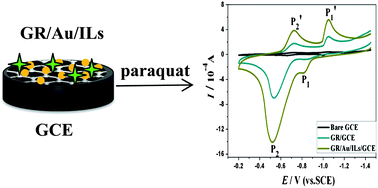Nanocomposite of graphene based sensor for paraquat: Synergetic effect of nano-gold and ionic liquids on electrocatalysis†
Abstract
A solution-based approach of chemical co-reduction of graphene oxide (GO) and HAuCl4 was used to prepare

* Corresponding authors
a
School of Chemistry and Chemical Engineering, Shandong University, Jinan 250100, China
E-mail:
zhangxl@sdu.edu.cn
Fax: +86-531-88564464
Tel: +86-531-88361318
A solution-based approach of chemical co-reduction of graphene oxide (GO) and HAuCl4 was used to prepare

 Please wait while we load your content...
Something went wrong. Try again?
Please wait while we load your content...
Something went wrong. Try again?
F. Cui, L. Chu and X. Zhang, Anal. Methods, 2012, 4, 3974 DOI: 10.1039/C2AY25795E
To request permission to reproduce material from this article, please go to the Copyright Clearance Center request page.
If you are an author contributing to an RSC publication, you do not need to request permission provided correct acknowledgement is given.
If you are the author of this article, you do not need to request permission to reproduce figures and diagrams provided correct acknowledgement is given. If you want to reproduce the whole article in a third-party publication (excluding your thesis/dissertation for which permission is not required) please go to the Copyright Clearance Center request page.
Read more about how to correctly acknowledge RSC content.
 Fetching data from CrossRef.
Fetching data from CrossRef.
This may take some time to load.
Loading related content
